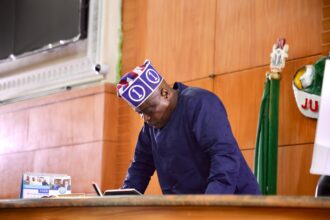...To get all news updates, Join our WhatsApp Group (Click Here)
Also Join our WhatsApp Channel (Click Here)
The Pan African financial institution, United Bank for Africa (UBA) has released its unaudited first quarter results, showing significant growth across major income lines.
Following a sterling performance in 2016 financial year, UBA Group delivered another impressive 41% percent year-on-year growth in profit-before-tax in the first three months of 2017. Leveraging on strong growth in both interest and non-interest income as well as increased efficiency, UBA recorded N25.5 billion in profit before tax in the first quarter, ending March 31st 2017, compared to N18.1 billion achieved in the first quarter of 2016. The Group also recorded a profit after tax of N22.4 billion in the first quarter, an impressive 32 percent year-on-year growth compared to N17.0 billion achieved in the corresponding period of 2016. The group sustained its strong profitability recording an annualized 19.4% Return on Average equity(RoAE).
Driven by an unprecedented 43% year-on-year growth in interest income, UBA Group recorded a 38% percent year-on-year growth in gross earnings to close at N101.2 billion for the three months period ending March 2017, compared to N73.7 billion recorded in the first three months of the year 2016.
The Group Managing Director/CEO of the United Bank for Africa Group (UBA), Mr. Kennedy Uzoka, expressed satisfaction with the Bank’s impressive performance in the first quarter of 2017, despite intensifying competition and a very challenging business environment.
“Our performance in the first quarter of the year strengthens our optimism on economic and business recovery in Nigeria and many of our markets across Africa. More importantly, this result is evidence of efficiency gains in our pricing, balance sheet management and operations,” Uzoka said.
“Driven by our balance sheet liquidity, we grew interest income by 43% to an unprecedented quarterly run-rate of N77 billion. Buoyed by improving foreign currency supply in Nigeria, remittance and trade services fees almost doubled and foreign currency trading income grew by 148% year-on-year, as we leveraged our Customer First initiatives to gain market share in these offerings. More so, it is my pleasure to report that we made further progress in our consistent retail penetration, as reflected in the 12% year-to-date growth in retail savings and current account deposits. Notwithstanding the tight interest rate environment, we recorded a 30bps reduction in cost of funds to 3.4%, a positive result of our customer service-led approach to low cost deposit mobilization. As at Q1, low cost savings and current accounts (CASA) represent 80% of our deposit funding,” Uzoka explained.
While emphasizing the increasing relevance of its African operations to its bottom line, Uzoka said, “Our businesses outside Nigeria continued to wax stronger, contributing 35% of our earnings. We remained prudent in risk asset creation growing net loans by 2% year-to-date, as we have continued to monitor development in key sectors of the economy to take advantage of emerging bankable opportunities in due time. Albeit the structural challenges that exist in Africa, the opportunities and returns are immense and compelling. We will deepen our penetration across our chosen markets, as we diligently execute our strategies for consistent market share gain.”
Also speaking on UBA’s financial performance and position, the Group CFO, Ugo Nwaghodoh, said the Bank’s performance in the first quarter further proves its resilience and very strong prospect of the business across its chosen markets. He said that beyond the sterling growth in top and bottom lines, he remained particularly impressed with the quality of the earnings, which reflects the bank’s focus on the core business of financial intermediation and transaction banking.
“We remain steadfast on our prudent and proactive risk management, which helps to minimize the impact of the macroeconomic pressures on our portfolio. Our non-performing Loan ratio stood at 3.95%, with a 136% provisions coverage, inclusive of regulatory risk reserve. We remain well capitalized and liquid to fulfill our growth strategy; 19.4% BASEL II capital adequacy ratio and 41% liquidity ratio, which present opportunity to explore the headroom in our low LTD of 61%,” Nwaghodoh said.
You can get every of our news as soon as they drop on WhatsApp ...To get all news updates, Join our WhatsApp Group (Click Here)
Also Join our WhatsApp Channel (Click Here)









